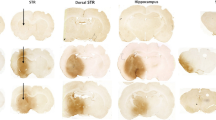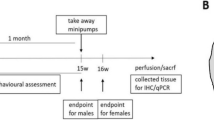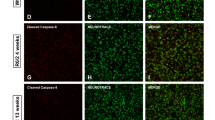Abstract
MCGEER and McGeer1 recently reported that an intrastriatal injection of glutamate results in biochemical changes in brain similar to those associated with Huntington's chorea. They postulated that glutamate, a putative excitatory transmitter and an ‘excitotoxin’ abundantly present in brain may have a role in the pathophysiology of Huntington's chorea. Their evidence for this postulate must be considered very preliminary, however, as the biochemical changes induced by a 50 nmol dose of glutamate were not striking and it was not determined whether these changes were accompanied by neuronal degeneration1. We have, injected various doses of glutamate directly into the rat striatum and examined the striatum for histopathological changes 21 d later. Here we report that doses of glutamate much higher than 50 nmol definitely cause striatal neurones to degenerate, whereas no neurotoxic reaction results from injecting equally high doses of control compounds such as NaCl or γ-aminobutyric acid (GABA).
This is a preview of subscription content, access via your institution
Access options
Subscribe to this journal
Receive 51 print issues and online access
$199.00 per year
only $3.90 per issue
Buy this article
- Purchase on Springer Link
- Instant access to full article PDF
Prices may be subject to local taxes which are calculated during checkout
Similar content being viewed by others
References
McGeer, E. G. & McGeer, P. L. Nature 263, 517–519 (1976).
Olney, J. W., Ho, O. L. & Rhee, V. Expl Brain Res. 14, 61–74 (1971).
Olney, J. W., Rhee, V. & Ho, O. L. Brain Res. 77, 507–512 (1974).
Olney, J. W., Sharpe, L. G. & de Gubareff, T. Neurysci. Abstr. 1, 371 (1975).
Coyle, J. G. & Schwarcz, R. Nature 263, 244–246 (1976).
Olney, J. W. & de Gubareff, T. J. Neuropath. exp. Neurol. 36, 618 (1977).
Olney, J. W. & de Gubareff, T. Brain Res. (in the press).
Swanson, L. G., Perez, V. J. & Sharpe, L. G. J. appl. Physiol. 33, 247–251 (1972).
Olney, J. W. J. Neuropath. Exp. Neurol. 30, 75–90 (1971).
Olney, J. W., Misra, C. H. & de Gubareff, T. J. Neuropath. exp. Neurol. 34, 167–177 (1975).
Olney, J. W., Schainker, B. & Rhee, V. in Hormones, Behaviour and Psychopathology (ed. Sachar, E. J.) (Raven, New York, 1976).
Roberts, P. J. & Watkins, J. C. Brain Res. 85, 120–125 (1975).
Kemp, J. M. & Powell, T. P. S. Phil. Trans. R. Soc. 262, 413–427 (1971).
Divac, I., Fonmun, F. & Storm-Mathisen, J. Nature 266, 377–378 (1977).
McGeer, P. L., McGeer, E. G., Scherer, U. & Singh, K. Brain Res. 128, 369–373 (1977).
Spencer, H. J. Brain Res. 102, 91–101 (1976).
Kim, J. S., Hassler, R., Haug, P. & Paik, K. S. Brain Res. 132, 370–374 (1977).
Author information
Authors and Affiliations
Rights and permissions
About this article
Cite this article
OLNEY, J., GUBAREFF, T. Glutamate neurotoxicity and Huntington's chorea. Nature 271, 557–559 (1978). https://doi.org/10.1038/271557a0
Received:
Accepted:
Published:
Issue Date:
DOI: https://doi.org/10.1038/271557a0
This article is cited by
-
Neuropathogenesis-on-chips for neurodegenerative diseases
Nature Communications (2024)
-
A human stem cell-derived test system for agents modifying neuronal N-methyl-d-aspartate-type glutamate receptor Ca2+-signalling
Archives of Toxicology (2021)
-
Prosaposin, a neurotrophic factor, protects neurons against kainic acid-induced neurotoxicity
Anatomical Science International (2021)
-
Neuroprotective properties of the excitatory amino acid carrier 1 (EAAC1)
Amino Acids (2013)
Comments
By submitting a comment you agree to abide by our Terms and Community Guidelines. If you find something abusive or that does not comply with our terms or guidelines please flag it as inappropriate.



